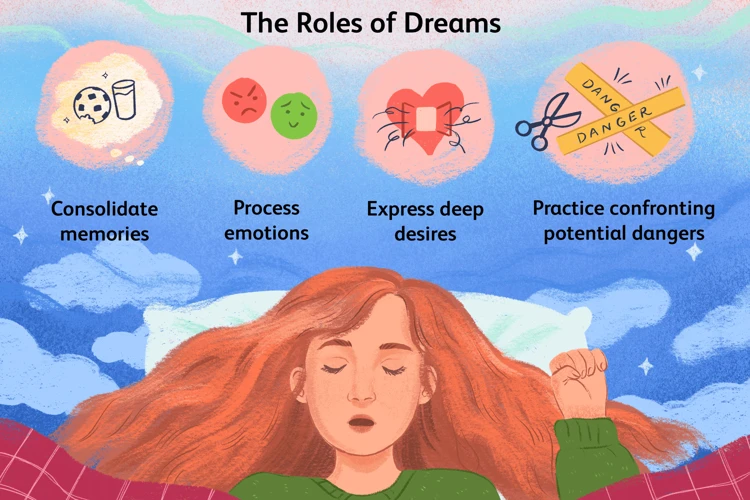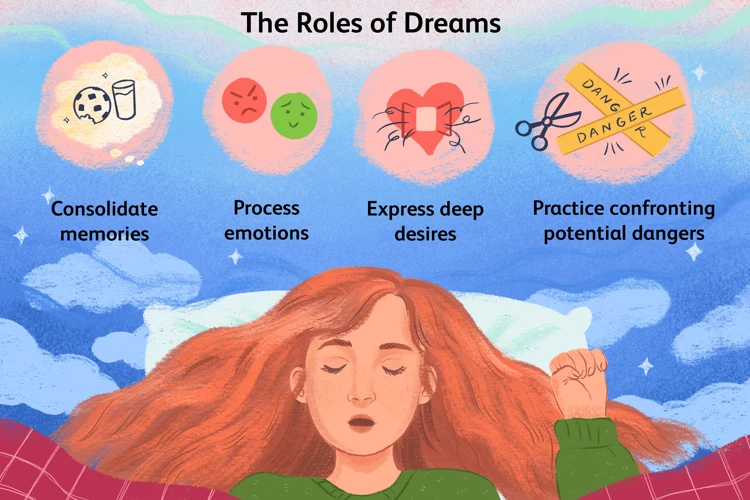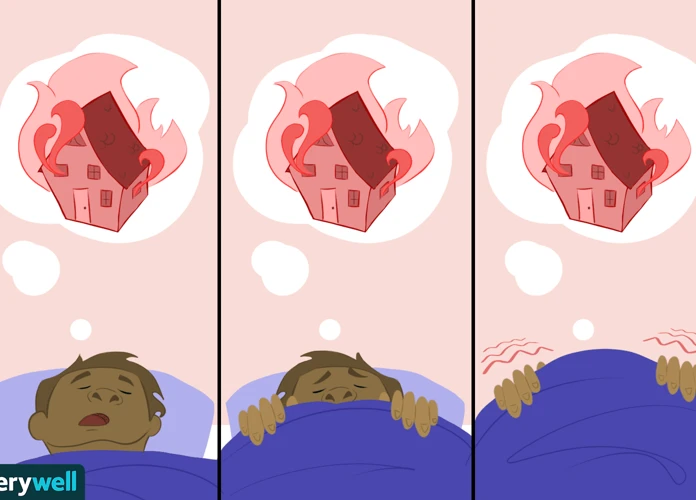Have you ever woken up in the middle of the night, heart pounding and drenched in sweat after a particularly harrowing nightmare? Nightmares can be incredibly vivid and unsettling experiences, often leaving us feeling confused, scared, and desperate for answers. But what if these haunting dreams held a deeper significance? In this article, we will delve into the science, interpretation, and psychological perspectives surrounding nightmares, providing you with valuable insights and practical tips for understanding and overcoming these unsettling nocturnal experiences. So, buckle up and prepare to explore the hidden depths of your dreamscape.
The Science of Nightmares

Nightmares have long fascinated scientists and researchers, as they offer a glimpse into the mysterious realm of dreams. The science of nightmares explores the purpose behind these disturbing dreams and the common themes that often manifest. One study suggests that nightmares may serve as a way for our brain to process and rehearse threatening situations, potentially preparing us for future real-life challenges. Another theory proposes that nightmares may arise from our subconscious mind trying to bring attention to unresolved emotional issues. Common nightmare themes can include being chased, falling, or experiencing intense fear and anxiety. By analyzing the symbolism and context within these dreams, we can gain deeper insights into our subconscious thoughts and emotions. Understanding the significance of animals in dream messages, deciphering the symbolism of water in dreams, and learning how to interpret common dreams can all contribute to unraveling the mysteries of nightmares. So, let’s dive into the intriguing world of nightmares and uncover the truths hidden within our slumbering minds. [how-to-interpret-common-dreams/]
1.1 The Purpose of Nightmares
The purpose of nightmares is a subject that has intrigued scientists and psychologists for years. These highly unsettling dreams serve a deeper function within our subconscious minds. One theory suggests that nightmares act as a form of emotional catharsis, allowing us to release and process intense negative emotions, fears, and anxieties. This process can be seen as a kind of emotional regulation, helping us to confront and deal with our deepest fears within the safe confines of the dream world. Another perspective proposes that nightmares serve as a rehearsal mechanism for potential real-life threats and challenges. By experiencing these frightening scenarios in our dreams, we may be better equipped to handle similar situations in our waking lives. It is also believed that nightmares can occur as a result of unresolved emotional issues or traumatic experiences. Understanding the purpose and deeper meaning behind nightmares can offer valuable insights into our psyche and emotional well-being. By exploring the significance of animals in dream messages, deciphering the symbolism of water in dreams, or learning how to interpret common dreams, we can gain a better understanding of the purpose and potential messages hidden within our nightmares. [significance-animals-dream-messages/]
1.2 Common Nightmare Themes
When it comes to nightmares, there are a variety of common themes that tend to recur in people’s dreams. These themes often evoke intense fear, anxiety, and a sense of helplessness. Understanding these common nightmare themes can provide valuable insights into our subconscious fears and concerns.
1. Falling: One of the most prevalent nightmare themes is the sensation of falling. This dream can leave us feeling out of control and vulnerable. It may symbolize a fear of failure, loss of control, or a sense of insecurity in our waking life.
2. Being chased: Being pursued by an unknown entity or a menacing figure is a frequent nightmare scenario. This theme can represent feelings of being overwhelmed, pursued by past mistakes, or a fear of confrontation.
3. Losing teeth: Many people have nightmares about their teeth falling out, crumbling, or being forcefully extracted. This unsettling dream can indicate underlying anxieties about appearance, communication, or loss of power and confidence.
4. Being trapped: Feeling trapped in a confined space or situation can be a recurring nightmare theme. It may reflect a sense of being stuck in a difficult or challenging circumstance, unable to find a way out or make progress.
5. Death or dying: Nightmares involving death or dying can be particularly distressing. These dreams may symbolize a fear of change, loss, or the impermanence of life.
6. Failing an important task or exam: Dreaming about failing an exam or not completing a crucial task is a common nightmare for many individuals, especially students. It can reflect anxiety about performance, fear of judgment, or a lack of confidence.
By recognizing these common nightmare themes, we can begin to unravel their symbolism and explore the underlying emotions and fears they represent. Delving deeper into their meanings can help us gain a better understanding of ourselves and the challenges we face. So, let’s unveil the secret messages hidden within our nightmares and discover how to interpret them [how-to-interpret-common-dreams/].
Interpreting Nightmares

Nightmares can be perplexing and unsettling experiences, but they also offer a doorway into understanding our deepest fears and emotions. Interpreting nightmares involves delving into the symbolism and context of the dream, reflecting on personal emotions, and identifying potential triggers. Analyzing the symbolism and context allows us to uncover hidden messages and meanings within the dream. For example, if a recurring nightmare involves being chased by a ferocious animal, it may symbolize feelings of being pursued or overwhelmed in waking life. Reflecting on personal emotions is crucial, as nightmares often reflect suppressed fears and anxieties. Exploring these emotions can provide valuable insights into our subconscious thoughts and help us address unresolved issues. Identifying potential triggers involves recognizing external factors that may contribute to the recurrent nightmares, such as stress, trauma, or certain medications. By unraveling the complex tapestry of our nightmares, we can gain a deeper understanding of ourselves and take steps towards healing and growth. [how-to-interpret-common-dreams/]
2.1 Analyzing Symbolism and Context
When it comes to understanding nightmares, analyzing the symbolism and context within these dreams can provide valuable insights. Each element and detail within a nightmare can carry symbolic meaning, representing deeper emotions, fears, or unresolved issues. By dissecting the symbolism, we can gain a better understanding of what our subconscious mind is trying to communicate. For example, dreaming about being chased could symbolize a feeling of being pursued or overwhelmed in waking life. Falling dreams might indicate a lack of control or fear of failure. To unlock the meaning behind these symbols, it’s important to consider personal associations and cultural references. Additionally, examining the context of the nightmare is crucial. Context refers to the specific circumstances and events leading up to the dream. For instance, a nightmare occurring after watching a horror movie or experiencing a traumatic event may be directly linked to those triggers. Analyzing symbolism and context requires a combination of self-reflection, dream journaling, and research on common dream symbols. By exploring resources on the significance of animals in dream messages, decoding the symbolism of water in dreams, or understanding how to interpret common dreams, we can navigate the intricate web of our subconscious minds and unravel the hidden messages within our nightmares. [symbolism-water-dreams/]
2.2 Reflecting on Personal Emotions
Reflecting on personal emotions is a crucial aspect of interpreting nightmares. 2.2 Reflecting on personal emotions involves exploring the feelings and emotions experienced during the nightmare and connecting them to aspects of our waking life. The emotions we feel in our dreams can often be magnified versions of what we experience in reality. For example, if we feel overwhelming anxiety or fear in a nightmare, it may indicate that we are facing similar emotions in our daily lives. By reflecting on these emotions, we can gain valuable insight into our own psychological well-being and identify any underlying issues that may be causing distress. It’s essential to ask ourselves questions such as: What specific emotions did I feel during the nightmare? Can I relate these emotions to any current situations or unresolved issues in my life? Taking the time to reflect on personal emotions can help uncover hidden fears, insecurities, or unresolved conflicts that may be influencing our dreams. Understanding the connection between our dreams and our emotions empowers us to make positive changes and address any emotional challenges we may be facing. [how-to-interpret-common-dreams/]
2.3 Identifying Potential Triggers
Identifying potential triggers for nightmares is a crucial step in understanding the underlying causes of these unsettling dreams. involves examining various factors that might contribute to the occurrence of nightmares. One common trigger is stress and anxiety, which can infiltrate our subconscious and manifest in our dreams. Examining our daily lives and identifying sources of stress, such as work pressures, relationship issues, or financial concerns, can help us pinpoint potential triggers for our nightmares. Another trigger to consider is past traumas. Painful memories and unresolved emotional experiences can resurface in our dreams, leading to recurring nightmares. By seeking therapy or professional guidance, we can address these traumas and work toward healing, potentially reducing the frequency and intensity of nightmares. External factors such as certain medications, sleep disorders, or even environmental influences like noise or an uncomfortable sleeping environment can also contribute to nightmares. Identifying and mitigating these external triggers can be instrumental in minimizing the occurrence of distressing dreams. By understanding and addressing potential triggers, we can take proactive steps to promote more peaceful and restful nights. [how-to-interpret-common-dreams/]
Psychological Perspectives on Nightmares

From a psychological standpoint, nightmares offer valuable insights into our mental and emotional well-being. The role of dreams in mental health is a significant aspect when exploring the psychological perspectives on nightmares. Dreams, including nightmares, provide a window into our unconscious mind, allowing us to process repressed emotions and unresolved conflicts. Nightmares as manifestations of anxiety are commonly observed, with themes of fear, danger, and helplessness reflecting our stress and worries. They can serve as indicators of underlying anxiety disorders and can be useful for therapists in identifying and addressing these issues. Additionally, for those who have experienced trauma, nightmares and trauma often go hand in hand. Trauma survivors may suffer from recurring nightmares that replay distressing events, making it crucial to understand the connections between trauma, nightmares, and the potential for healing. By exploring these psychological perspectives and seeking professional guidance when necessary, we can gain a deeper understanding of ourselves and work towards better mental well-being. [significance-animals-dream-messages/]
3.1 The Role of Dreams in Mental Health
Dreams play a crucial role in our mental health, acting as a window into our subconscious mind. reveals the intricate connection between our dreams and our psychological well-being. During sleep, our brains enter a state where they can process and consolidate memories, emotions, and experiences from the day. Dreams provide a platform for this processing, allowing us to integrate and make sense of the events of our lives. They serve as a release valve for pent-up emotions and stresses, offering an opportunity for catharsis and emotional regulation. One study found that dream recall frequency is positively associated with better psychological and emotional health. Dreams can provide insight into our inner conflicts, desires, and fears, acting as a powerful therapeutic tool. Understanding the significance of animals in dream messages, interpreting the symbolism of water in dreams, and learning how to interpret common dreams can all contribute to unlocking the therapeutic potential of our dreams. So, let’s explore the rich tapestry of our dreams and harness their healing power for our mental well-being. [significance-animals-dream-messages/]
3.2 Nightmares as Manifestations of Anxiety
Nightmares can often serve as manifestations of anxiety, providing a window into our subconscious fears and worries. When we experience heightened levels of stress or anxiety in our waking lives, these emotions can seep into our dreams and manifest as terrifying nightmares. Anxiety-induced nightmares may feature scenarios that reflect our deepest concerns, such as being chased, attacked, or trapped in dangerous situations. These dreams can be incredibly distressing, leaving us feeling overwhelmed and anxious even after waking up. It is important to note that nightmares can also contribute to the development or exacerbation of anxiety disorders, creating a vicious cycle of fear and sleep disturbances. It is crucial to recognize the potential link between anxiety and nightmares in order to address and manage both aspects effectively. Seeking professional help from a therapist or counselor can provide valuable support in understanding and addressing the underlying causes of anxiety-induced nightmares. Additionally, implementing stress-reducing techniques such as mindfulness, relaxation exercises, and maintaining a healthy sleep routine can help alleviate anxiety and promote more peaceful sleep. [how-to-interpret-common-dreams/]
3.3 Nightmares and Trauma
Nightmares and trauma are deeply interconnected aspects of the human psyche. Nightmares can often be a manifestation of past traumatic experiences and serve as a way for the mind to process and cope with the lingering effects of such events. Individuals who have undergone significant trauma, such as physical abuse, accidents, or witnessing distressing incidents, may experience nightmares as their mind wrestles with the emotional aftermath. These nightmares can be vivid and distressing, often featuring scenes and scenarios reminiscent of the traumatic event. It is crucial to understand that nightmares related to trauma are not a sign of weakness but rather a natural response to deeply unsettling experiences. If you or someone you know is struggling with nightmares stemming from trauma, seeking professional help from a therapist or counselor specializing in trauma can provide invaluable support and guidance. Additionally, various treatment approaches, such as cognitive behavioral therapy (CBT) and eye movement desensitization and reprocessing (EMDR), have shown promising results in helping individuals overcome the impact of trauma-related nightmares. Remember, healing from trauma takes time and patience, but with proper support and treatment, it is possible to find relief and move towards a brighter future. [significance-animals-dream-messages/]
Overcoming Nightmares
Dealing with nightmares can be a daunting task, but there are strategies and techniques that can help in overcoming nightmares. Establishing a relaxing bedtime routine can create a peaceful sleep environment and reduce the likelihood of disturbing dreams. Engaging in activities such as reading a book or taking a warm bath before bed can promote relaxation and calmness. Additionally, practicing lucid dreaming techniques can empower individuals to take control of their dreams and actively steer them in a positive direction. Lucid dreaming involves becoming aware of the dream state while asleep, allowing for conscious participation and manipulation of the dream narrative. For those struggling with persistent and distressing nightmares, seeking professional help from a therapist or counselor who specializes in dream analysis and trauma can provide invaluable support and guidance. Remember, by understanding and addressing the underlying causes and triggers of nightmares, we can take steps towards a peaceful and restful night’s sleep. [how-to-interpret-common-dreams/]
4.1 Establishing a Relaxing Bedtime Routine
Establishing a relaxing bedtime routine is crucial in promoting restful sleep and reducing the occurrence of nightmares. Here are some tips to help you create a soothing bedtime ritual:
- Create a calm environment: Transform your bedroom into a tranquil oasis by removing any distractions or sources of stress. Use soft lighting, play soothing music, or incorporate relaxing scents like lavender to set a peaceful atmosphere.
- Engage in relaxation techniques: Incorporate relaxation techniques such as deep breathing exercises, meditation, or gentle stretching into your bedtime routine. These practices can help calm the mind and release tension in the body.
- Avoid stimulating activities: Before bed, limit activities that can increase arousal or anxiety levels. This includes avoiding screens (such as smartphones, tablets, or laptops) at least an hour before bed, as the blue light emitted can disrupt sleep patterns.
Creating a consistent and comforting bedtime routine can signal to your brain that it’s time to unwind and prepare for restful sleep. By prioritizing relaxation and minimizing stressors, you can help create an optimal sleep environment and improve the quality of your sleep, reducing the occurrence of nightmares. So, start incorporating these practices tonight and enjoy a more peaceful night’s sleep. [how-to-interpret-common-dreams/]
4.2 Practicing Lucid Dreaming Techniques
Practicing lucid dreaming techniques can offer a unique and empowering approach to navigating the realm of nightmares. Lucid dreaming is the state of being aware that you are dreaming while still in the midst of the dream itself. This awareness allows you to actively participate and even manipulate the dream narrative. One technique to achieve lucid dreaming is reality testing. Throughout the day, consistently question whether you are dreaming or awake, performing reality checks like trying to push your finger through your palm or looking at a clock multiple times. This practice can carry over into your dreams, triggering the realization that you are in a dream state. Another method is keeping a dream journal, recording and analyzing your dreams regularly. This helps to enhance dream recall and recognition, making it easier to identify when you are dreaming. Additionally, using mnemonic induction of lucid dreams (MILD) involves repeating a mantra like “I will be aware that I’m dreaming” before falling asleep, reinforcing the intention to achieve lucidity. By incorporating these techniques into your routine, you can increase the likelihood of experiencing lucid dreams and gain control over the outcome of your nightmares. So, why not give it a try and unlock the wondrous potential of lucid dreaming? [how-to-interpret-common-dreams/]
4.3 Seeking Professional Help
Seeking professional help can be an essential step in overcoming recurring nightmares and understanding their underlying causes. A mental health professional, such as a therapist or psychologist, can provide valuable guidance and support throughout the process. They have the expertise to help you delve into the deeper meanings behind your nightmares and explore any emotional or psychological issues that may be contributing to their frequency or intensity. Through therapy sessions, you can gain greater self-awareness, identify potential triggers, and develop coping mechanisms to manage anxiety and trauma associated with nightmares. Additionally, a professional can help you differentiate between normal dream experiences and potential signs of a more serious condition, such as post-traumatic stress disorder (PTSD). They may recommend specific techniques, such as cognitive-behavioral therapy (CBT) or exposure therapy, to address and alleviate your nightmares. Remember, seeking professional help is a proactive and empowering step towards better sleep and mental well-being. So, don’t hesitate to reach out and connect with a qualified professional who can guide you through the process. [significance-animals-dream-messages/]
Conclusion
In conclusion, understanding the significance of nightmares can offer us deeper insights into our inner thoughts, emotions, and experiences. Nightmares serve a purpose, whether it be processing threatening situations, highlighting unresolved issues, or manifesting as manifestations of anxiety or trauma. By analyzing the symbolism and context within our nightmares, we can gain valuable information about ourselves and potentially uncover hidden fears or desires. It is important to reflect on personal emotions and identify potential triggers that may be contributing to the frequency or intensity of our nightmares. Establishing a relaxing bedtime routine, practicing lucid dreaming techniques, or seeking professional help can all be effective strategies for overcoming nightmares and achieving a more restful sleep. Remember, dreams can be rich in symbolism and hold messages that are unique to each individual. Exploring the significance of animals in dream messages or deciphering the symbolism of water in dreams can offer further insights into the meaning behind our dreams. So, embrace the journey of understanding and unlocking the hidden depths of your subconscious mind. [significance-animals-dream-messages/]
Frequently Asked Questions
1. What causes nightmares?
Nightmares can be caused by a variety of factors, including stress, trauma, medication, sleep disorders, and even certain foods. They often occur during the REM (rapid eye movement) stage of sleep, which is when dreams are most vivid.
2. Are nightmares a sign of mental illness?
Not necessarily. While nightmares can be more common in individuals with mental health conditions such as anxiety and post-traumatic stress disorder (PTSD), they can also occur in people without any underlying mental illness.
3. Can nightmares be prevented?
While it may not be possible to completely prevent nightmares, there are strategies that can help reduce their frequency. Establishing a consistent bedtime routine, creating a calm sleep environment, and managing stress levels can all contribute to a better night’s sleep with fewer nightmares.
4. Can nightmares be a form of therapy?
Some researchers believe that nightmares can serve as a form of emotional therapy, allowing the mind to process and confront unresolved issues. However, this is still a subject of ongoing investigation and not applicable to all nightmare experiences.
5. Is it helpful to keep a dream journal?
Keeping a dream journal can be a useful tool for understanding the symbolism and patterns within your nightmares. By jotting down details immediately upon waking, you can gain insight into your subconscious mind and potentially identify recurring themes or triggers.
6. Do recurring nightmares have a deeper meaning?
Recurring nightmares often indicate that there is an unresolved issue or deep-seated fear that needs to be addressed. Exploring the underlying emotions and themes of these dreams can provide valuable insights into your subconscious and may help facilitate personal growth.
7. Can medication help with nightmares?
In some cases, medication may be prescribed to help manage nightmares, especially if they are related to a specific sleep disorder or mental health condition. However, the use of medication should be discussed with a healthcare professional to determine the best course of action.
8. Can lucid dreaming techniques be used to control nightmares?
Lucid dreaming techniques, which involve becoming aware that you are dreaming while still in the dream state, can potentially be used to exert control over nightmares. By practicing these techniques, individuals may develop the ability to change the course of their nightmares or wake themselves up from the dream.
9. When should I seek professional help for my nightmares?
If your nightmares are causing significant distress, affecting your daily life, or are accompanied by other symptoms such as insomnia or anxiety, it may be beneficial to seek professional help. A healthcare professional or sleep specialist can provide guidance and recommend appropriate treatment options.
10. Can nightmares be beneficial?
While nightmares can be unsettling, they can also have potential benefits. Nightmares can serve as a catalyst for introspection, helping us confront our fears and unresolved emotions. Additionally, they may act as a warning sign or reflect real-life stressors that need attention. By understanding and learning from our nightmares, we can gain deeper insights into ourselves and promote personal growth.








